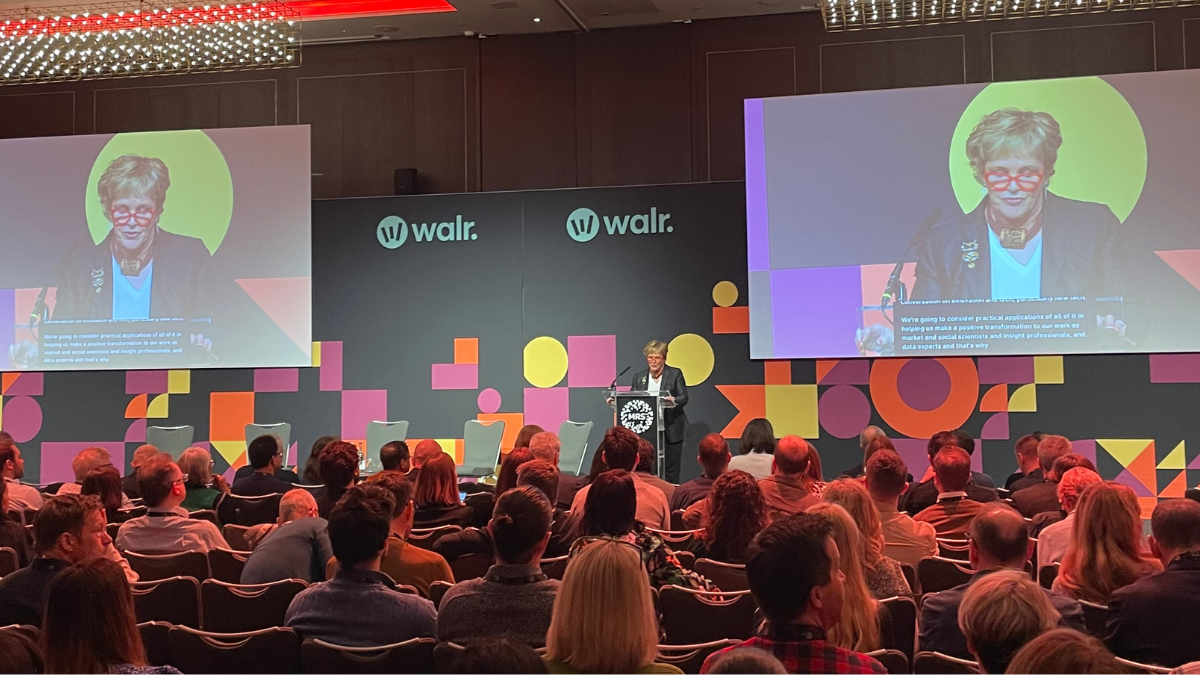There’s a disconnect between how business leaders are utilising generative AI compared to the British public. According to Kelly Beaver, MBE, CEO of Ipsos UK & Ireland, eight in ten senior professionals regularly use AI, compared to just 7% of the British public.
‘There’s quite a disconnect,’ she said at the 2024 MRS Annual Conference, which took place yesterday (12 March) and explored the theme of Applied Transformation. In addition to the disparity in usage, she revealed that the British public are more anxious than excited about the role of AI.
‘We used to be a really tech-positive, tech-optimistic nation. You can see in the work we’ve done across 31 different countries that in Britain, we’re more anxious than we are excited about generative AI and its possibilities. For a lot of younger people, they’re even more anxious than they are excited.’
Younger people may be more eager to adopt this new technology yet remain more anxious than their older counterparts. Speaking to a crowd of market research professionals during the ‘Navigating New Horizons with Generative AI’ panel, Beaver expanded on this point, suggesting that younger colleagues in the workforce may be ‘deeply anxious and worried about what it means for their own jobs and the task that they’re doing.’
Chris Lindsley, Global Insight & Analytics Director at Reckitt, echoed this point, saying that in terms of generative AI in the workforce, the mindset is best described as ‘glass half empty.’ Despite discussions around the anxiety of AI, the sentiment among the panel was clear: AI will coincide with humans, not take over.
Lindsley explained how Reckitt is ‘building a base map’ of the company’s jobs, unpacking how much time is spent on them and where AI can lend a helping hand. ‘Critically, we should consider what we enjoy doing and what we don’t enjoy doing, so we’re not taking away jobs people love to do,’ he said.
‘We believe in the power of human intelligence partnering with artificial intelligence,’ Beaver added.
How AI is being applied
AI was a big focus at the multi-streamed event. The day included 28 curated sessions, 31 client perspectives, and 3 keynote sessions addressing the transformative issues facing agencies and in-house teams. Jane Frost CBE, CEO of MRS, kicked off the conference by welcoming attendees and revealed that the UK research insight and analytics industry is worth in excess of £9bn, according to MRS estimations.
She said, ‘The UK accounts for more than 50% of all European social and market research output.‘
Pippa Crerar, Political Editor of The Guardian, followed with a keynote exploring what current affairs and the forthcoming election are likely to mean for businesses and a disenchanted public. She touched on her role in reporting on six general elections and exposing the Partygate and Barnard Castle scandals.
In one of the first presentations of the day, Tom Ellis, CEO of Brand Genetics, and Suzanne Verbeek, Senior Insights Manager at AB InBev Europe, shared their findings from ‘Generative AI vs. Researcher.’
In the head-to-head contest, a human researcher and a researcher equipped with a customised version of ChatGPT-4, optimised for research, were each given the findings of a focus group and asked to write a topline report. A client jury judged which one resulted in better quality work. The ABinBev client team members independently assessed three criteria and gave an overall score. The human beat the AI by one point with an overall score of eight. The AI fell short in the ‘Actionability and Strategic Value’ section, failing to extract the nuances that a human can.
Despite the loss, Ellis highlighted AI’s benefits in research. ‘From an academic perspective, every hour of research should have three hours of analysis. AI can help us get through that data to help us accelerate that thinking.’
He added: ‘It’s probably a no brainer that we’ve got to start to find ways to start implementing this.’
Featured image: Jane Frost / MRS Conference 2024

